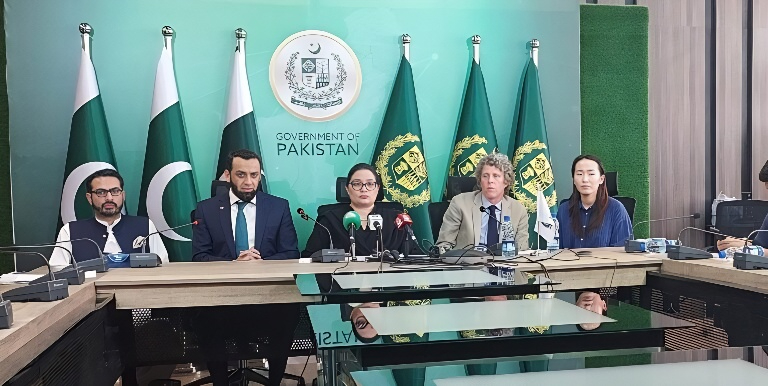Islamabad, Sep 12: Pakistan is currently dealing with the largest climatic disaster, and if we do not take immediate action, it will only get worse. Increasingly frequent and severe heat waves, destructive floods, and dwindling groundwater supplies all necessitate strengthening Pakistan’s resistance to the effects of climate change.
It’s time to update our development paradigms and deal with these issues, which seriously jeopardize local economies, ecosystems, and communities. Romina Khurshid Alam, the Prime Minister’s Coordinator for Climate Change and Environmental Coordination, made this claim on Thursday at a media briefing about the Recharge Pakistan initiative held at the PTV Headquarters in this city.
The Federal Flood Commission under the Ministry of Water Resources, the Green Climate Fund, the U.S. Agency for International Development (USAID), The Coca-Cola Foundation (TCCF), WWF, and the Ministry of Climate Change and Environmental Coordination all support the Recharge Pakistan project.
This seven-year project intends to start a paradigm change in Pakistan’s approach to water and flood control systems and shows how ecosystem-based adaptation and green infrastructure interventions in the Indus basin may be sustainable, beneficial, and affordable. Some of the most vulnerable communities in the nation that are impacted by the effects of climate change benefit from the project by becoming more resilient.
In an interview with the media, WWF-Pakistan’s Senior Director for Recharge Pakistan, Fawad Hayat, stated that “despite various interventions, climate change has re-shaped the landscape of Pakistan with serious implications for the water resources.” In order to improve conditions and restore wetlands and water channels in the Indus Basin, the Recharge Pakistan project proposes using natural methods.
This would help minimize the area of flooding by 50,800 hectares and collect an estimated 20 million cubic meters of water. The project will increase food security, provide alternative and sustainable livelihood possibilities for local populations, and strengthen community resilience against climate change.
“WWF is extremely proud to support this groundbreaking initiative, which aims to harness the power of nature,” stated Lucas Black, Vice President of Climate Finance at WWF-US. With the goal of immediately enhancing resilience and improving the lives of over 680,000 people throughout the Indus Basin, this ground-breaking project is the largest climate adaptation project that WWF has ever undertaken.
We are extremely grateful for the support and participation of the Government of Pakistan, the Green Climate Fund, The Coca-Cola Foundation, USAID, and WWF-Pakistan for bringing this vision to reality.”The WWF-Pakistan is carrying out this initiative at a few locations in the provinces of Sindh, Balochistan, and Khyber Pakhtunkhwa (KP), working closely with local populations and government agencies. The DI Khan, Ramak, Manchar, and Chakkar Lehri Watersheds are some of the principal project locations. The initiative will maximize the advantages of flood reduction to the most vulnerable populations, thereby improving climate resilience.









